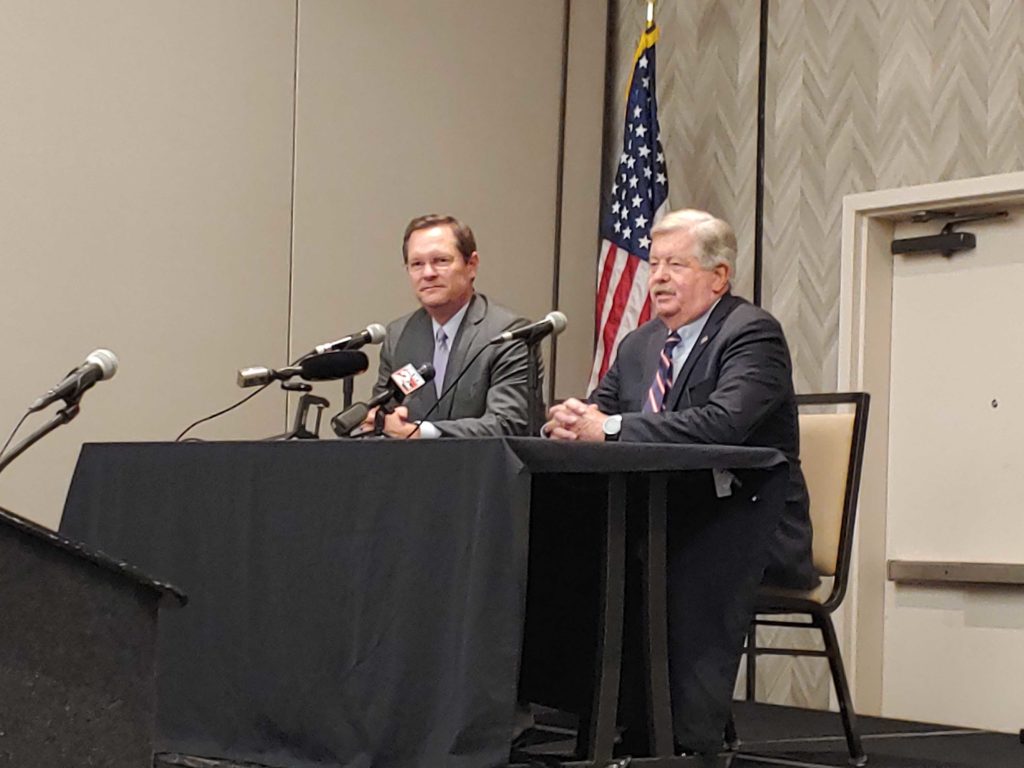
When Tennessee’s Republican leadership don’t like a lawmaker’s bill, that probably means their legislation is on borrowed time. In the 10th week of the 112th Tennessee General Assembly, we saw big bills sputter and smaller bills sail right on through. Here are some highlights.
Senate slows momentum on Texas-style abortion law
After weeks of preparation, lawmakers seemed ready to pass a sweeping anti-abortion bill that would effectively ban all abortions, not just those occurring after six weeks of pregnancy.
The law is modeled after a Texas-style law allowing private citizens to sue anyone who has provided or helped provide an abortion — though bill sponsor Rep. Rebecca Alexander, R-Jonesborough, said she planned to go a step further.
“Texas law prohibits abortion once medical professionals can detect cardiac activity — usually around six weeks — the Tennessee language proposes to prohibit all abortion,” she said before a committee hearing.
The bill only carves out one exception, for the life of the mother, but not in cases of rape or incest.
But after passing one committee in the House this week, disapproving comments from Senate Speaker Randy McNally may have stopped it in its tracks.
“I don’t support it, and the reason is it will complicate the case that we already have that’s moving up to the Supreme Court,” he said Thursday.
McNally says it could complicate Tennessee’s current court case over implementing its ‘fetal heartbeat’ bill. While he agrees with the intent of Alexander’s bill, he first wants to see if the U.S. Supreme Court will uphold Tennessee’s ban.
The first hearing in the Senate for the bill has been delayed by two weeks. That’s also not a good sign for the bill sponsors.
Lawmakers want to stop cities from blocking oil and gas pipelines
Legislation that would prevent local governments from banning or impeding fossil fuel projects is advancing. Memphis lawmakers say it feels like, once again, their city is specifically targeted by the bill.
Plains All American, an oil company, wanted to build a 49-mile pipeline going through the Memphis area. The route would’ve gone through mostly Black neighborhoods. After public outcry, the project was cancelled, and the Shelby County Commission passed an ordinance that would prevent pipelines closer than 1,500 feet to residential communities.
Now, the state is attempting to override the city’s objections. And Memphians are worried the project could come back, but this time they’ll have no say in stopping it.
“How would a community even decide or protest a pipeline being built in their community? Do they come up to the legislature? Do they reach out to the electorate, elected officials across the state? What is the power of those that locally serve them?” questioned Sen. Raumesh Akbari, D-Memphis.
She called the legislation “disappointing.” Republicans backing the bill say decisions on pipelines should be made by the state. It’s scheduled to be heard by the House Commerce Committee on March 22.
Republicans weigh a litmus test for running for Congress
Federal law allows individuals to run for Congress in any district they’d like as long as they are at least 25 years old and have been U.S. citizens for seven years. But Tennessee lawmakers want to put more restrictions on running for Congress after a flurry of newcomers moved to the state.
The bill follows the creation of three vastly changed congressional districts in Middle Tennessee after Republicans redrew the maps in their favor. The move sparked Nashville’s 5th Congressional District incumbent, Democratic Congressman Jim Cooper to announce he wouldn’t seek reelection. Since then, Morgan Ortagus, a former spokesperson for the U.S. State Department and former President Donald Trump-endorsed candidate, has announced she’d like to run.
While good news to Republicans in the district who supported Trump, it seems not all Republicans are happy. They’ve drafted a bill that would essentially prevent Ortagus, who moved to Nashville in 2021, from running. The legislation would require a candidate to live in the state for three years before they can hold a seat.
But whether the residency requirement will go into effect before or after the midterm elections is still up for debate. The Senate passed a version that would go into effect immediately, preventing Ortagus from running, while the House’s version wouldn’t go into effect until after November.
Middle State Tennessee political science professor Kent Syler says the bill has exposed an “intra-party fight among Republicans.”
Which version lawmakers adopt will have to be hammered out between the two chambers — or possibly in a conference at the end of session.
ICYMI: More stories from the Capitol
- Lawmakers put brakes on proposal that could reduce the amount of gun-free zones in Tennessee
- With time running out, lawmakers are still fuzzy on the details of the state’s education funding overhaul
- NewsChannel5 highlighted proposed legislation that would prevent local governments from regulating Airbnb’s.

